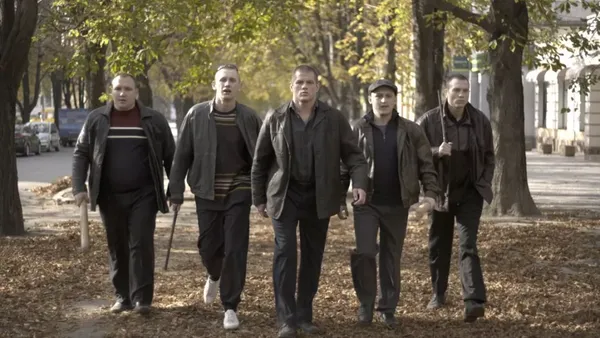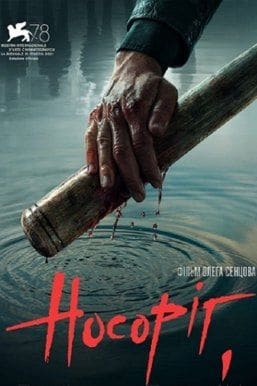Eye For Film >> Movies >> Rhino (2021) Film Review
Rhino
Reviewed by: Jennie Kermode

When the Soviet Union collapsed in the early 1990s, many Westerners imagined that the countries previously within it would become joyful places, quick to adopt a Western way of life, perhaps with some cultural input from their pre-Soviet traditions. They were not prepared for what actually happened, as many places, left with very little infrastructure and sociologically damaged by years of having to deal with secret police and arbitrary justice systems, simply collapsed or fell into a semi-feudal state presided over by gangsters. It’s a an experience which more impoverished areas are still struggling to overcome. Oleh Sentsov’s latest work finds a parallel for it in the story of one man.
This man is Vova, later dubbed ‘Hосоріг,’ or ‘Rhino,’ by local gangsters. We first meet him when he’s just a boy, scrapping on waste ground and subsequently trying to pass off his bruises as accidental. He grows up in a home where his father’s drinking creates a constant climate of instability and sometimes violence. The shadow of the Afghan war hangs heavily over the family and there is never much sense of moral authority. By the time he reaches his teens, Rhino is picking fights in the local nightclub (which, in true post-Soviet style, looks like a run down school disco), even hitting his own friends without being able to articulate why. A later mugging in the local marketplace brings him to the attention of Skull (Vladyslav Derduga), the local crime lord, which goes badly for him at first but subsequently opens up opportunities for which his talent for unthinking violence can be put to use.

That this is something more than just another indulgent hard man fantasy is immediately apparent from the depiction of Rhino’s childhood, in which the camera roves around his house as we move through time, so that characters who were having dinner in one room wander into another differently dressed, a little older, having an argument, and so on. It’s a technique once popular on the Ukrainian stage which is beautifully realised here through Bogumil Godfrejów’s cinematography. It’s evocative of the chaos of a household with three children and a dog and a constant stream of friends and relatives coming and going; a place where there is affection but where peace can quickly be followed by conflict. As the youngest, Rhino is often ignored, left to deal with the world on his own terms.
This opening also establishes a key psychological aspect of Rhino’s experience. Throughout the film, events happen to and around him. He’s a participant, sometimes a leader, but he never seems properly aware of his own agency. A succession of actors – Dymytro Dima, Ivan Tamashev and Serhii Filimonov – capture this trait perfectly and achieve seamless continuity as we observe his progress. It takes a long time from Rhino to recognise that his violence is aberrant, or to place it in any kind of moral framework. Similarly, when he cheats on his wife, he seems to perceive it as a sort of accident, confused by her response. Only when he suffers a horrific loss does he begin to recognise that others have separate existences outside himself and that there might be more to life that simply ploughing a path through chaos by way of brute force.
The second part of the film deals with Rhino’s efforts to understand and take control of his life, which create fresh conflicts for him to deal with. The violence is shot in a matter of fact way which reflects a lack of examination on the part of those doing it out. The tortures we see are those of men with limited tools and still less imagination, but they are nonetheless vicious. The fights are instinctive, without much craft – though there is plenty in the way they are framed. Rhino and the other men in the film attach little value to women, but in a key early scene in which Rhino has attracted the attention of the police, we see his girlfriend exhibit her own toughness in getting him out of trouble, and handle him in a long-suffering way which suggests a parallel world in which women manage their own lives and see the animalistic men as something akin to pets.
What Sentsov does really well here is to show us the humanity which lies within even the most monstrous of these men. There’s no sense that he’s apologising for their actions, but there’s a recognition that brutality begets brutality and that straining towards civilisation is something quietly wonderful even when thr bar is very low. in this he is aided by a heartfelt performance from Filimonov, who has no left acting – for the meantime – to play his part in fighting off the Russian invasion of his country. One imagines that any Russian soldiers who see this film will be ready to turn tail and run – though it might also prompt them to reflect on the damage done by their former empire, as Rhino seeks another way of living.
Reviewed on: 24 Mar 2023
















